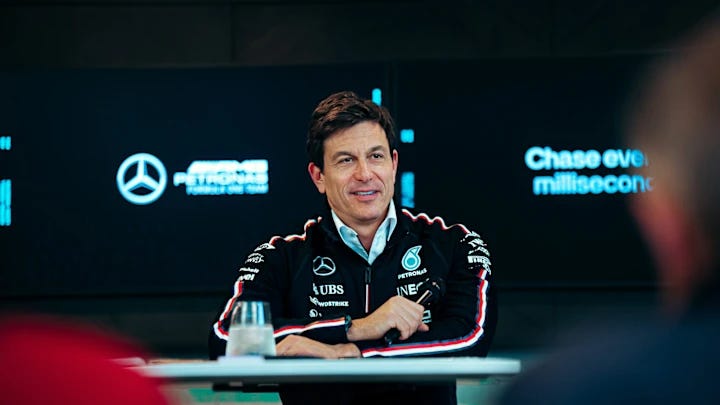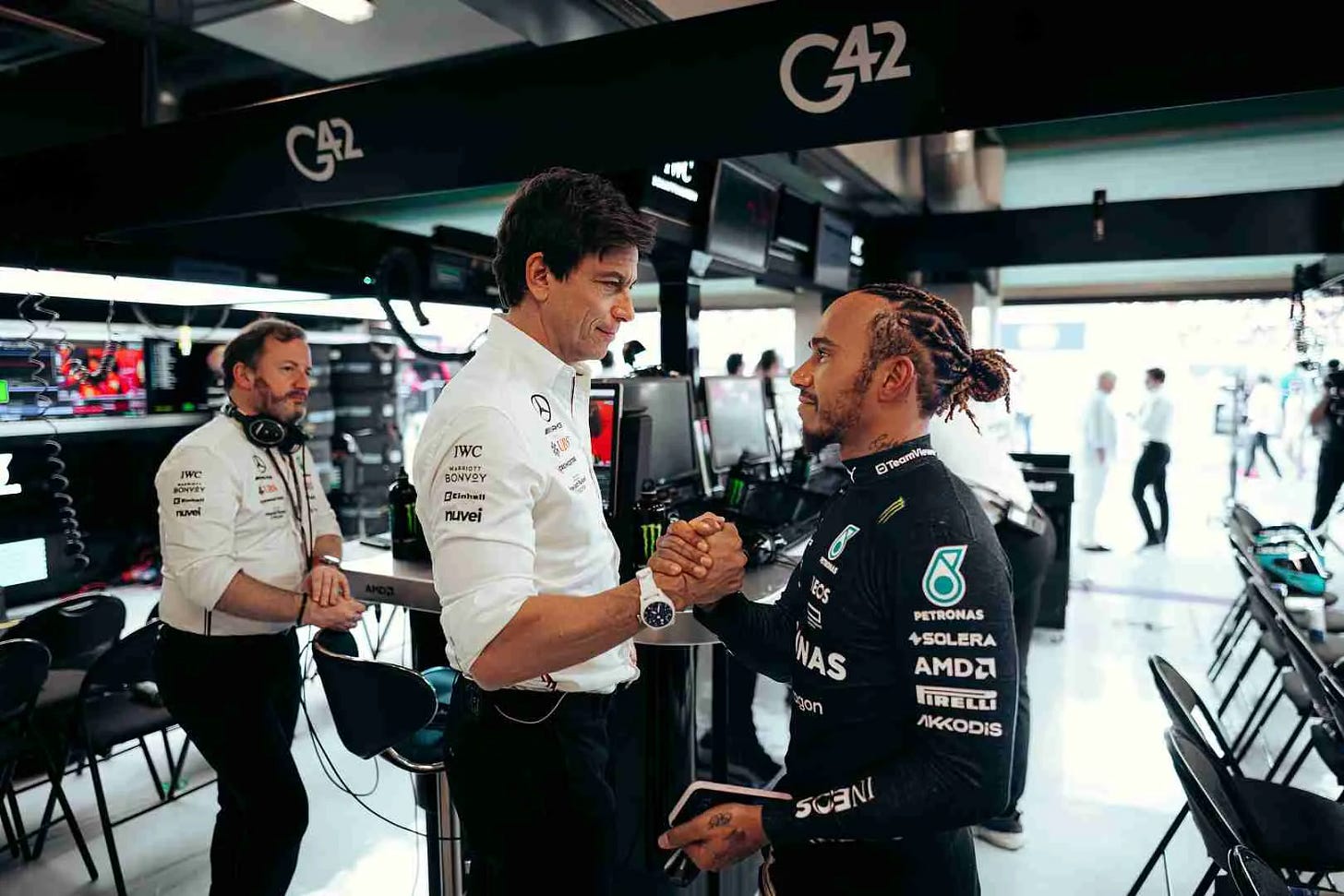Hello Dealmakers and Future Titans,
Welcome back to The Dealmaker Blog, where we dissect the strategies and stories of the most influential figures in business, finance, and beyond. Today, we’re diving into the world of Formula 1, spotlighting the man who has steered Mercedes-AMG Petronas Formula One Team to unprecedented success—Toto Wolff. Known for his meticulous attention to detail and an insatiable drive for perfection, Wolff’s journey offers profound insights for business leaders, investors, and anyone striving to excel in high-pressure environments.

Teaser for the Current Edition
In this edition, we explore the complex psyche of Toto Wolff, his unique approach to leadership, and the critical moments that propelled him to the pinnacle of motorsport. Whether you’re a business owner looking to fine-tune your leadership style or an investor seeking to understand the importance of timing and risk management, Wolff’s story is a masterclass in the art of winning. Share this post with your network, and don’t forget to subscribe for more thought-provoking content!
Content Overview
By the end of this post, you'll gain a comprehensive understanding of:
- Toto Wolff’s background and his rise to dominance in Formula 1.
- The pivotal moments and strategic decisions that defined his career.
- His unique leadership style and definition of risk.
- Practical lessons for business owners and investors inspired by Wolff’s approach.
Unyielding Drive, Unseen Battles
Toto Wolff is a name synonymous with success in the world of Formula 1, but his journey to the top has been far from easy. Under his leadership, Mercedes clinched seven consecutive Constructors' Championships, an achievement that underscores his place among the sport’s greatest minds. Yet, behind the glittering success is a man who has battled depression for over two decades, a struggle that adds a layer of complexity to his public persona. Wolff’s candidness about his mental health struggles offers a glimpse into the psychological toll of leadership, reminding us that even the most successful figures are not immune to internal battles.
I often wonder about this, as many successful people seem to exude incredible confidence and almost unshakable optimism. It makes me question whether that’s a prerequisite for success. Personally, I find myself questioning my decisions and whether what I’m doing is meaningful, so it’s reassuring to see that even those who have reached extraordinary heights struggle with similar doubts and yet manage to overcome them.
Wolff’s approach to leadership is meticulous, often to an obsessive degree. His attention to detail extends from ensuring the spotless condition of his team’s motor-home bathrooms to meticulously planning his sleep schedule with the help of NASA scientists. But this level of control stems from deeper fears. As Wolff himself puts it, “Whatever I do, I do not take risks.” But what’s interesting is Wolff’s definition of risk. It’s not the possibility of failure, but the potential for an outcome that he could not live with. This unique understanding of risk adds an intense, almost existential weight to every decision he makes, whether in the boardroom or on the racetrack.
The Right Place at the Right Time
Wolff’s rise in Formula 1 wasn’t just about relentless drive—it was also about seizing the right opportunities when they presented themselves. His entry into the sport came through an invitation to invest in the Williams racing team, a move that would lay the foundation for his future successes. At Williams, Wolff didn’t just provide financial backing; he was soon involved in the day-to-day operations, eventually being asked to help run the team. This opportunity was more than a career milestone; it was the moment that allowed Wolff to immerse himself in the world of Formula 1, setting the stage for his eventual domination with Mercedes. His story is a powerful reminder that success often hinges on being in the right place at the right time—and being ready to seize the moment when it comes.

The Price of Winning—and Losing
During Mercedes’ era of dominance, Wolff was rarely forced to face failure. Winning became second nature, and the need for self-reflection was often eclipsed by the constant stream of victories. However, the W13 car, which faltered in ways Wolff had never experienced before, brought him face-to-face with the failure he had long dreaded. Wolff’s reaction was visceral: “In the moment, I hate it,” he said of the W13. This slump was no longer a hypothetical scenario but a harsh reality, forcing Wolff to confront his limits.
Interestingly, Wolff found a strange sense of calm in these setbacks—a calm that unsettled him. He worried that adapting too well to losing might erode his ambition, the very trait that had driven him to such heights. “I’m not sleepless,” he confessed, but the fact that he wasn’t losing sleep over these failures filled him with dread. This internal conflict—being both relieved and frustrated by a loss—highlights the psychological complexities that have come to define much of Wolff’s career. It serves as a reminder that the battle at the top is as much internal as it is external.
Seeing Around Corners: Wolff's Strategic Vision in Motorsport
Investing in startups provided Toto Wolff with the financial foundation and strategic acumen to return to his true passion—motorsport. This venture back into racing wasn’t just about reliving the thrill of competition; it was about building something greater. As Wolff transitioned from investor to manager, he began nurturing young talent and mastering the commercial aspects of the sport. This dual focus on both the business and the human elements of racing positioned him uniquely for future success. In a conversation with René Berger around the year 2000, Wolff confidently predicted, “One day, I will own a Formula 1 team.”
That foresight began materializing when one of his clients, Canadian driver Bruno Spengler, joined ASM, a Formula 3 Euroseries team managed by Frédéric Vasseur. ASM’s engines were supplied by HWA, a high-performance car company founded by Hans Werner Aufrecht, an engineering legend known for his work with Mercedes. In 2006, Wolff’s vision took another step forward when he acquired a forty-nine-percent stake in HWA. Aufrecht, impressed by Wolff’s ability to anticipate the future, remarked, “He can see round corners.” Wolff’s strategy wasn’t just about looking ahead—it was about understanding the broader landscape, anticipating challenges, and positioning himself and his ventures for sustained success in a highly competitive environment.
This adjustment reinforces the themes of strategic foresight and leadership under uncertainty, tying the paragraph more closely to the rest of the article.

An Uncompromising Leader
Wolff’s success at Mercedes isn’t just the result of his own drive; it’s also a product of his uncompromising leadership style. Known for making what some might consider unreasonable demands, Wolff has never been one to sugarcoat the truth. His wife, Susie Wolff, puts it bluntly: “You don’t get to where he is by being a guy that’s super nice with everyone.” Wolff’s leadership philosophy is encapsulated in his favorite phrase, “tough love,” which has become a cornerstone of his management approach. This method pushes his team to exceed expectations, though it also tests their limits, as Wolff sets standards that can seem unattainable.
Wolff’s motivations are deeply rooted in competition, a drive that is as primal as it is professional. When asked what draws people to Formula 1, Wolff’s response was telling: “It’s an alpha-male thing. You want to beat the other guy. It’s very archaic.” This competitive spirit is not just a personal trait; it’s something Wolff instills in his entire team. At the start of the 2021 season, Wolff sent an all-staff email with a simple but intense directive: identify your counterpart at Red Bull and make them your focus. “Look at him/her every day,” Wolff wrote. “Put the picture right in front of you so you know whom to beat.” This tactic, as intense as it may seem, is emblematic of Wolff’s leadership style—driven by competition and fueled by an insatiable desire to win.
Navigating Uncertainty: The Role of Imperfect Information in Leadership and Investing."
In both racing and investing, leaders often have to make critical decisions without the benefit of perfect information. As Toto Wolff aptly put it, “This sport is never going to give you perfect information.” This reality was starkly illustrated during a recent race when a seemingly minor incident—a car stalling on lap forty-eight—triggered a chain of events that dramatically altered the outcome. The interruption led to a “virtual safety car,” levelling the playing field and causing Mercedes to lose its tactical advantage as rivals like Verstappen seized the opportunity to switch tires and gain an edge. In these moments of uncertainty, the team radio becomes a cacophony of requests, calculations, and controlled panic, reflecting the rapid decision-making required under pressure. Wolff’s reaction—questioning what had just happened—is emblematic of the challenges leaders face when navigating information asymmetry.
In the world of investing, this scenario is not unlike the unpredictability of markets, where decisions must be made with incomplete data and the outcomes often hinge on unforeseen variables. Information asymmetry—where one party has more or better information than the other—can be both a challenge and an opportunity. For leaders and investors alike, the key lies in managing these uncertainties, making the best possible decisions with the information at hand, and remaining agile enough to adapt when new information surfaces. Just as in racing, success in investing often depends not on having perfect information, but on how well one navigates the gaps and leverages the available insights to make informed, strategic moves.
The Human Element in a Data-Driven World
Wolff’s leadership style is a delicate balance between human intuition and data-driven decisions, a combination that sets him apart in the high-tech world of Formula 1. Unlike most team principals, who are glued to the pit wall surrounded by engineers and strategists, Wolff prefers to stay in the garage, slightly removed from the race’s immediate fray. His role is less about commanding and more about guiding, asking probing questions and challenging his team without dictating their every move. “They are living in the data world,” Wolff acknowledges, but he’s quick to remind them that “there’s a human in the data.”
This balance between gut feeling and empirical evidence is a cornerstone of Wolff’s philosophy. While Mercedes’ success has been built on technical excellence, Wolff understands that human intuition and the ability to make decisions under pressure are just as critical. This human element is something that data alone cannot capture, and it’s what has allowed Wolff to lead his team to such incredible heights.
Redefining Risk
One of the most revealing aspects of Wolff’s philosophy is his unique definition of risk. For Wolff, risk isn’t merely the possibility of a negative outcome; it’s the potential for a result that he couldn’t live with. This perspective on risk underscores the gravity with which he approaches every decision. Whether it’s a strategic move on the racetrack or a business decision in the boardroom, Wolff ensures that every action is calculated, with the potential consequences weighed carefully. This approach has served him well, allowing him to maintain control in the high-pressure world of Formula 1, but it also adds a layer of psychological intensity to his leadership style.
Lessons from the Edge
For business owners and investors alike, Wolff’s story offers several key takeaways:
- Embrace Vulnerability: Wolff's candidness about his mental health struggles is a powerful reminder that acknowledging weaknesses can be a source of strength. In high-stakes environments, where pressure is constant, taking care of mental well-being is not just important—it’s essential.
- Balance Data with Intuition: While data is critical, especially in fields like F1, it’s the human touch that often makes the difference. Wolff’s ability to blend data-driven decision-making with gut instincts has been a major factor in his success.
- Control What You Can—And Let Go of the Rest: Wolff’s obsession with control has driven him to the top, but it’s also a double-edged sword. For leaders, understanding where to exert control and where to allow flexibility is crucial.
- Redefine Risk: Wolff’s definition of risk as a potential outcome he couldn’t live with is a powerful framework for making decisions. It pushes leaders to think deeply about the true stakes of their choices and to prepare accordingly.
- Leverage the Right Opportunities: Wolff’s entry into Formula 1 through Williams was a defining moment, showing the importance of being ready to seize opportunities when they arise. Success often comes down to being in the right place at the right time and making the most of it.
- Perfection Is a Moving Target: Even after years of unparalleled success, Wolff doesn’t see himself as having “made it.” This mindset—of constantly striving for improvement—is both a blessing and a curse, a reminder that in business and in life, the pursuit of perfection is never truly over.
Closing Thoughts
Toto Wolff’s journey is one of contrasts—between success and failure, control and chaos, data and intuition. It’s a journey that resonates far beyond the world of Formula 1, offering lessons for anyone striving to reach the top of their field. As Wolff himself puts it, “It’s halftime in an entrepreneurial life.” And as we all know, in sports and in business, the second half is where the game is won or lost.

